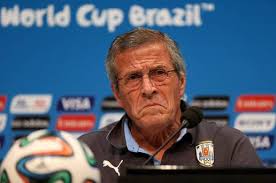By Andrew Warshaw in Rio de Janeiro
June 28 – Uruguay’s football federation has confirmed to FIFA that it intends to appeal against the record World Cup suspension imposed on Luis Suarez for biting. FIFA announced that Suarez’s team have seven days to prepare the necessary paper work before an appeals panel sits to deliver a final verdict.
Suarez was banned from all football for four months, plus nine international matches, and fined SFR100,000 ($112,000) for biting Italy’s Giorgio Chiellini.
On Friday Uruguay coach Oscar Tabarez (pictured) repeated the claims of Uruguayan football officials and politicians that Suarez had been the victim of unfair pressure from the English-speaking media. Additionally, he argues, FIFA are not being fair-minded when it comes to sanctions and that other incidents have gone unpunished.
Although what happens elsewhere should have no bearing on Suarez’s own appalling behaviour, Tabarez does have a point about lack of consistency. Why, for instance, was no action taken retrospectively by FIFA’s disciplinary committee after France defender Mamadou Sakho clearly elbowed Ecuador’s Oswaldo Minda in the goalless draw between the sides on Wednesday.
That argument has been fuelled by Jiri Dvorak, FIFA’s chief medical officer, noting earlier this week that elbowing to the head is now a red-card offence.
Uruguay’s decision to appeal followed a bizarre pre-match press conference on Friday when Tabarez announced he was resigning from his roles on FIFA’s technical study group, responsible for evaluating matches, in protest at the severity of Suarez’s punishment.
Instead of taking questions and bringing a player with him – mandatory under FIFA guidelines – Tabarez used the occasion to make an often rambling 15-minute speech with no mention of the game today.
He said those who punished Suarez had “values that are very different from those that I believe I have.”
Despite the fact that it was the third time in his career that Suarez had been punished for biting an opponent – the previous two suspensions were imposed by the Dutch and English leagues – Tabarez, with little justification, said Suarez was being made a “scapegoat.”
“Who wins, who loses? Who benefits, who is harmed? Who ended up getting things their way?” the coach said in Spanish. “We never thought or expected what we found out when we were told about the details of the punishment – of an excessive severity. The decision was much more focused on the opinions of the media, and that media attacked immediately at the conclusion of the match. … I don’t know what their nationality was, but they all spoke English.”
His comments came just hours, however, after FIFA secretary-general Jerome Valcke refuted the suggestion that Suarez had been singled out and said the Liverpool striker actually needed treatment to curb his moments of madness.
“The disciplinary committee’s work was based on all the video footage and all the different angles from up to the 34 cameras . . . you can use this video footage and they decided [what he did] was beyond the game, far beyond the fair play and attitude you can have when you play at the World Cup,” said Valcke.
“When you are at the World Cup the teams and the players have to show the best of the best because they are the example for the rest of the world. The decision to sanction the player was because what he did is unacceptable and that is not the image we want to give. The disciplinary committee took into consideration past events and his past behaviour.
“They made a decision based on the evidence and information and past of what this player has done and that’s why it’s not limited to international games but a general football ban.”
“I think he should find a way to stop doing it. He should go through treatment. It is definitely wrong. If it’s the first time it’s an incident, if it is more than once it is not an incident. That is why the ban was exemplary.”
Contact the writer of this story at moc.l1745189987labto1745189987ofdlr1745189987owedi1745189987sni@w1745189987ahsra1745189987w.wer1745189987dna1745189987

